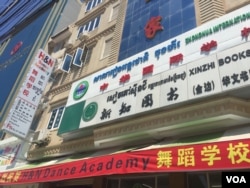In a small courtyard in downtown Phnom Penh sits the city’s oldest public school. Founded more than 100 years ago, Tuan Hoa features a Chinese temple and Mandarin language instruction for its 2,000 students.
Despite their long history and close political ties, Chinese usage in Cambodia’s capital still lags behind English, making the school a niche educational choice for now.
School Deputy Director Loeung Sokmenh said there is growing reason for students to learn Chinese, including employment as translators, tour guides and the chance to study abroad.
“Now, the tourists and investors, garment factories are coming [to Cambodia], they need translators,” she explained. “Now, the investors from China, Singapore, and Malaysia to build in factories, they need Chinese and Khmer languages. Also for tourism as well.”
Across town is the Zhongchua International School, a private, Chinese-run institution that opened its doors to about 200 students last August.
Here, the students learn Khmer and Mandarin or Khmer and English. A staff member who spoke with VOA but did not want to be identified said more than half of the Cambodian kids are in Khmer-English classes, while the Mandarin classes are filled more with Chinese students who are living in Phnom Penh with their parents.
Despite the rapidly rising number of Chinese tourists and businesses in Cambodia, and close ties between the two governments, far more Cambodians are still learning English as their preferred second language.
Top level relationship
Sino-Khmer political and economic relations have grown very strong in recent years. Chinese investment has risen steadily, Chinese tourists are second on the list of foreign visitors, and Beijing is one of the largest funders of Cambodian infrastructure projects.
Khlot Thyda, president of Royal Academic of Cambodia and personal advisor to Prime Minister Hun Sen, said that although the two countries have had good relations dating back to ancient times, the country’s relationship still depends largely on personal ties between their leaders.
She says there is also an understanding that the relationship comes at a cost, “because, as you know, no one will help you if you don’t help them in return.”
Cambodia’s Prime Minister routinely extols the benefits of his country’s ties with Beijing.
During the inauguration of a Chinese road in Kampong Speu province last week, Prime Minister Hun Sen said relations are at a top level. “Especially we [Cambodia] get much assistance from China,” he said.
According to Hun Sen, China will provide aid worth up to around $140 million in 2015, an increase from around $100 million last year.
Two way street
Cambodia’s government, for its part, has been outwardly supportive of China, especially on the controversial issue of disputed maritime claims in the South China Sea.
Phnom Penh has consistently backed Beijing’s desire for bilateral-only negotiations despite calls from Southeast Asian neighbors, especially Vietnam and the Philippines, for a multi-lateral solution to the problem.
But these growing economic and political bonds do not necessarily lead to stronger cultural ties.
Chheang Vannarith, a professor at Leeds University in Britain, said despite China’s stronger engagement with Cambodia, its cultural influence is not growing because Beijing is putting much more emphasis on military and infrastructure assistance.
He says China should do more to support social services and civil society.
“This is a lack of support in China to Cambodia, “said Vannarith. “China has no policies to support the civil society, but [does have policies for] assistances from government to government and business to business. China should reconsider that issue in order to improve its image.”
Benefits of Chinese instruction
The lag in Chinese cultural and linguistic influence is not for lack of trying on the part of Beijing, which has opened several language and cultural schools in Cambodia, including its first overseas Cultural Mission above the Zhongchua school last year.
Cambodia Minister of Education Hang Chuon Naron said Mandarin lessons do pay off for some students in the form of about 100 annual scholarships from Beijing to study at Chinese universities.
But despite these incentives, he admits that Chinese instruction still lags that of English.
“The Chinese students are very small in number compared to students who study English,” he said.
These days in Cambodia’s capital, western cultural influences still seem dominant in Cambodia, with foreign films, English signs and billboards across the city, and the prevalence of western brands seen in stores and on the streets.
But as China’s economy grows, Education Minister Hang Chuon Naron says, so will its broader influence.
“Chinese [is] the trend of business in Southeast Asia, as most of the business people are speaking Chinese, including those from Singapore, Malaysia, and the Philippines.”











